Brandon Stanton's Blog, page 23
March 1, 2022
Bila Tserkva, Ukraine (HONY Archives, 2014)
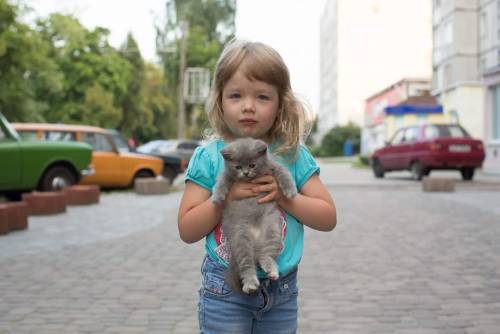
Bila Tserkva, Ukraine (HONY Archives, 2014)
February 28, 2022
“I’m already mentally preparing myself for the first...

“I’m already mentally preparing myself for the first boyfriend.”
(Kyiv, Ukraine)HONY Archives 2014
“I can’t wait until I’m a dad, so I can buy...

“I can’t wait until I’m a dad, so I can buy myself a skateboard.”
(Odessa, Ukraine: HONY Archives 2014)
February 27, 2022
“We’ve already suffered so much. We’ve lost so many people...
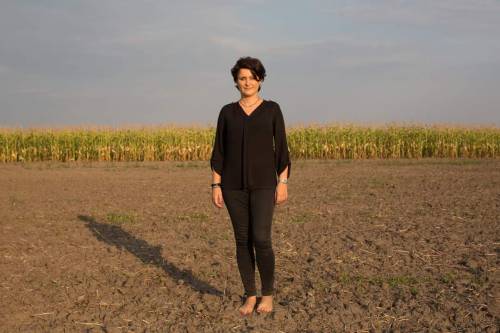
“We’ve already suffered so much. We’ve lost so many people to war, and famine, and historical events. Almost seven million Ukrainians were killed in World War II, more than any other country. We don’t need much. We’re not an imperialistic people. We aren’t very warlike. Our land is covered with black soil, so we can grow everything we need. We just need peace.”
(Baryshivka, Ukraine: HONY Archives 2014)
February 26, 2022
She initially said “no” when I asked for a photo, but another...

She initially said “no” when I asked for a photo, but another old woman walked by, and began speaking passionately in Ukrainian. Apparently convinced by the words of the passerby, the woman shrugged, and posed for the picture. After everything was finished, I asked my interpreter: “What did that other woman say?”“She said: ‘You must not refuse a photo, because you must represent the women of your land. Now go to eternity!’”(Odessa, Ukraine, HONY Archives 2013)
February 19, 2022
“I was just a girl from Poland. But I wasn’t afraid when I came...
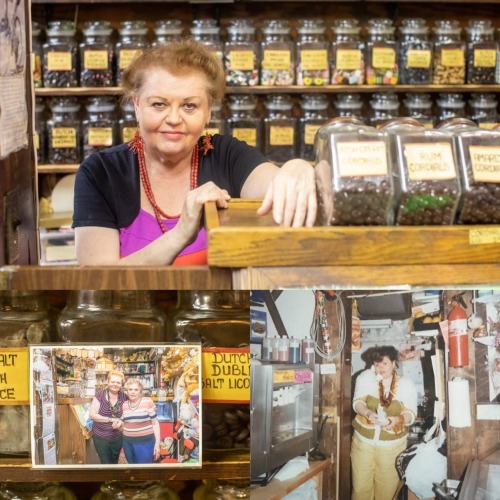
“I was just a girl from Poland. But I wasn’t afraid when I came here. It was like a big, beautiful machine to me. The energy, the madness of it. On my very first day I stood on the corner of Broadway and 44th Street. People were screaming and yelling. All of it was beautiful, even the bad stuff. Back home it had been so strict. Everything by the book. But here you had the freedom. Right away I was thinking: ‘This is my city. I want to be a part of it.’ I got my first job working at a delicious German bakery. I didn’t speak any English. But I have a photographic memory. Anything I can see, I can do. I learn to make everything: the candies, the cookies. Even the perfect little Easter Bunnies. Then one day I see an advertisement in the New York Times. I opened right to the page: ‘Sandler’s Chocolate Shop for sale.’ It felt like destiny. I do my research in the old way. For two weeks I stood across the street from the shop and counted all the people. Then I tell Mr. Sandler: I am ready to buy the store. I memorized the recipe of all the chocolates. I learned the taste of each of them. I have a thing for colors. When I’m surrounded by colors, my whole body shakes. So I chose all the perfect colored boxes. My mother came to work with me every day. We fight, but ‘love fight.’ The fight of stupid things. We were very close. More like sisters. We knew everything that needed to be done, even without speaking. For 25 years we run the shop together. She’s been gone for seven years now. I miss her very much. And without her it is much more work, but I am trying my best. For 32 years this has been my normal life. Doing the chocolate and the cookies. It has always felt like normal thing to me. Like I’m just one of millions. Ordinary girl doing her job. That’s the way I was thinking. But recently people are coming in here every day, they are saying: ‘You cannot go down. We will miss you.’ I never realize how much the people likes me, and this makes me extremely proud. Do you know what they say to me? All the people? They tell me: ‘Kamila, we need you here.’ Can you imagine that? Me, just a girl from Poland. They say: ‘You are part of New York. The city needs you.’”
Like so many other business owners, Kamila fell into a giant sinkhole with her rent during the pandemic. She worked out a deal with her landlord, but still owes nearly $100,000. If anyone would like to help Kamila save her 32 year old business, Kamila’s friends have created a GoFundMe for her: https://bit.ly/MyzelsChocolates
And if anyone would like to get New York’s tastiest chocolates and candies for Valentines Day, you can visit Kamila at Myzel’s Chocolates on 140 W. 55th.
January 27, 2022
(12/12) “When we reopened the doors of Ginjan Café, our regular...
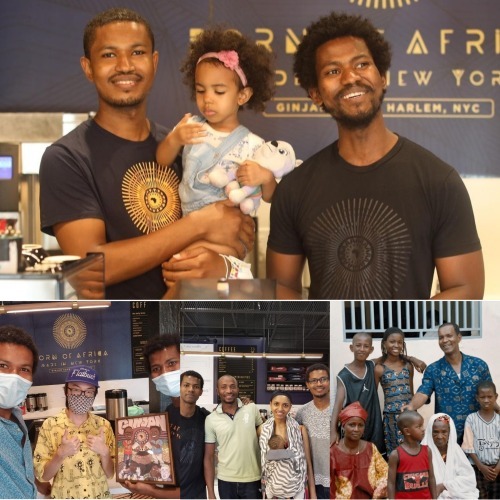
(12/12) “When we reopened the doors of Ginjan Café, our regular customers started coming back. It was slow at first. We had limited hours. We cut back our menu. But gradually people got excited about the business again. We’ve grown ten percent, month-by-month, since the day we reopened. We found our first big investor, it was one of our customers. And next month we’re going to open our second café location in Brooklyn. The business is stronger than it’s ever been. There’s something bittersweet about it. We wish we’d gotten here sooner. So that our sister was here to see it, and our father. But we got here. We had every reason to give up. We had every reason to go down the wrong path, and it would have been justified. But we never did. Because we had a firm foundation. It came from so long ago, when we were kids back in Guinea. But we had it. We had a loving family. And we held onto that, through everything. Sometimes on weekends we have a new helper around the store. In 2019 my daughter Kenza was born, and she’s almost three now. She’s given me a new reason for living. There are times when we’ll be doing the simplest things; we’ll be taking a walk, and she’ll be waving at strangers. Or she’ll be bombarding me with questions. And I’ll realize I have the biggest smile on my face. I’m not just going through the motions. Last week we were at the playground. It was just a normal trip to the playground. There was nothing special about it. But as we’re leaving, Kenza grabbed onto my hand. She said: ‘Daddy I’m so happy.’ It’s the first time I’d ever heard her express it. And it made me realize: I’m happy too. I’m not fighting to get back to who I used to be. I’m happy, right now. You should see Kenza with her Uncle Rahim. She calls him on WhatsApp, just to talk gibberish. And he loves it. He gets so excited. He does spoil her a little too much. For her birthday he got her the biggest bike you’ve ever seen. She can’t even reach the pedals. And there’s no rules with him. He’ll let her ride on his back for hours. He’ll let her watch any show. He’ll feed her whenever she asks. He can never say ‘no’ to her. She’s his princess. And whatever she wants, she gets.“
(11/12) “When I went to high school in Atlanta we read this poem...
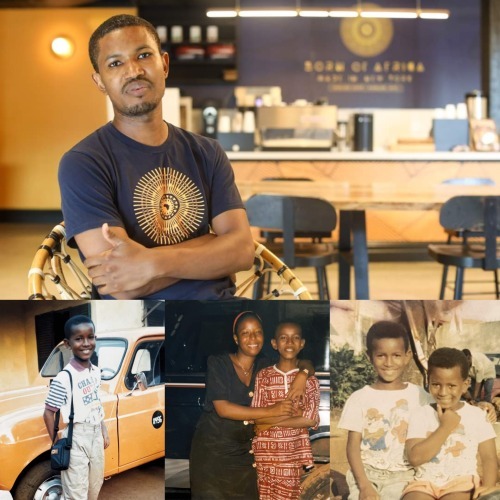
(11/12) “When I went to high school in Atlanta we read this poem by Langston Hughes, A Dream Deferred. It’s about what happens when you have a dream, but you wait too long for it. Does it dry up, like a raisin in the sun? If you fight too hard for something, for too long, does it still have meaning when you get it? Or was the cost too great? For twenty years I’d been working nonstop. The pandemic was the first time I could do nothing, without feeling guilty. It was the first time I could sit and think. So much had happened to me since coming to America: the death of my sister, the death of my father, other things that I’m still not ready to talk about. I’d never taken the time to deal with any of it. All that stuff was still in there. I’m pretty sure I’d been depressed for years. By nature I’m a positive person. Growing up I was always smiling. And I held onto that nature for the longest time. You can’t lose by being good to people. That’s what I always believed. It’s what I saw from my father. It’s what I saw from my mother. And I was determined to hold onto that. Even after life hit me in every possible way. But when you start losing people you love, it’s different. Loss hits you differently. It’s not the loss. It’s the love. When you have love, and it’s taken away, it leaves holes. You look the same but you’re not the same. When I first came to America, I had so many reasons. So many reasons to fight. But our sister is gone. Our father is gone. Our mother may not have much time left. Does it even matter anymore? Does the dream still matter? Or did I fight too long for it? Is it all dried up? These were difficult questions to answer. I almost fell into a dark place. There were a lot of mornings I didn’t want to get out of bed. But Rahim wouldn’t let me. He decided we were going to start exercising during the pandemic. Every morning at 6 AM, he’d knock on my door. He’d get me out of bed. He’d take me to the park across the street from Yankee Stadium, and we’d run laps, and do exercises. I didn’t want to do any of it. But he kept coming back, every morning, asking if I was ready to go. I wanted to tell him no. But it’s hard to say no when it’s your brother.”
(10/12) “With the money from the crowdfunding campaign we...
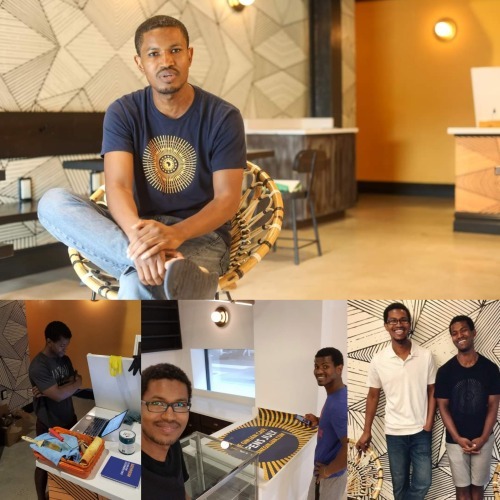
(10/12) “With the money from the crowdfunding campaign we decided to open a café. It had always been a dream of ours, to open our own place. But we thought it would be way down the road. Once the Ginjan brand was fully established. But the retail route was too expensive. A national rollout could cost millions, and we were only able to raise $200,000. So we needed another way for customers to find us. We chose a storefront in East Harlem. It’s a tough corner of the city. There’s a big drug crisis in the area. But it was the only place we could afford. After we signed the papers, and paid all our bills, there was hardly any money left. We had to do everything ourselves: the painting, the wallpaper, the carpentry. During the renovations Rahim and I were always together. It was the most time we’d spent together since we left Guinea. The conversations were flying back and forth. Rahim told me stories that I’d never heard before: about his life in prison, and his life in Michigan. For the first time I realized just how much he’d overcome. Rahim had been like my shadow growing up. He followed me everywhere. Sometimes I’d try to sprint away, but he was always behind me, doing all the things I did. Even after we came to America, I was ahead of him for a long time. But somewhere along the way he’d caught up. And he passed me on a lot of things. He became a confidant, a best friend, an equal partner. When I fell down he kept us going. If I’d done this alone, or if I’d had any other partner, the business never would have survived. In 2019 we finally opened the doors of Ginjan Café. By month five we were breaking even. People would come in off the street, take off their headphones, and begin talking to each other. An amazing little community of people began to form. It was working. We were building up our bottom line, little by little. But on March 17th the first COVID case hit the city. And a few days later we were forced to close our doors. We’d been so conditioned for bad things to happen. We were almost expecting it. But this time was different. Because there was nothing new to try. No new path to take. For the first time in my life, there was nothing I could do.”
(9/12) “We couldn’t believe our luck. It was the happiest thing...
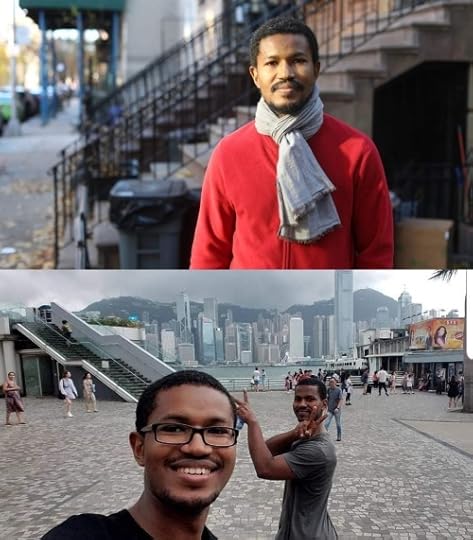
(9/12) “We couldn’t believe our luck. It was the happiest thing that had happened to us in a long time. They paid for all our flights. They booked us a room in a fancy hotel. And the night we arrived in Hong Kong, they took us to dinner at a Michelin star restaurant. At the table there was a whole team of advisors, from several different countries. It felt like something big was about to happen. Rahim and I spent the night practicing our pitch, and in the morning we travelled to the father’s office. It was on the top floor of a tower. We made our presentation. An Ivy League analyst questioned us about the financials. The father was clearly the one in charge, but they’d also flown in one of their uncles from Silicon Valley. He was dressed like a yogi. I think he taught billionaires how to meditate, or something. And after our presentation he was the first one to speak. He said: ‘Do you believe in numerology?’ We weren’t sure how to answer. But then he continued: ‘Nine is a very lucky number,’ he said. ‘And 3 + 5 + 1 = 9. So we’d like to offer you $351,000, for one-third of the company.’ It was much less than we’d hoped, but at least we had an offer. Unfortunately he wasn’t finished. He said: ‘If the business fails, we want all our money back. With 9 percent interest.’ Rahim and I looked at each other across the room. We were completely out of money. Our credit cards were maxed out. We were more beaten down than we’d ever been before. But we knew what the answer would be. Rule number one: no decisions out of desperation. After that trip we gave up on finding investors. We knew our only chance was to raise money from people who loved the drink, so we decided to hold an equity crowdfunding campaign. We sent the link to everyone on our contact list. A few of our friends wrote small checks, but most of the investments came from random people. These were people we’d met along the way. Maybe they’d passed our booth at a festival, and met these two brothers, selling this weird drink. And they decided to give it a try. And they loved it. So they followed along with our story. In the end we raised $182,450 from 261 different people. It was just enough to keep us going.”
Brandon Stanton's Blog
- Brandon Stanton's profile
- 768 followers



